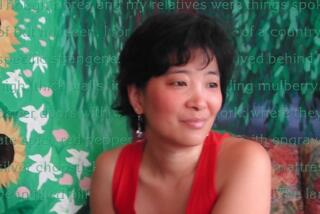Cruelty and Craziness Chinese-Style : BLOOD RED SUNSET: The Memoirs of a Pugnacious Prisoner, or, More Dung from Deng, <i> By Ma Bo</i> . <i> Translated by Howard Goldblatt (Viking: $24.95; 371 pp.)</i>
The Cultural Revolution--like anything to do with politics--seldom arouses the Chinese today. What really sells in Beijing and Shanghai these days are books of satire, semi-pornography, science fiction, psychology and nationalistic musings on the rise of China.
Yet here comes Ma Bo to dredge up seven nightmare years of domestic exile in Inner Mongolia during the 1960s and 1970s! How many Chinese, let alone Americans, want to relive the cruelty, self-delusion and zealotry of the Cultural Revolution? “Blood Red Sunset,” nevertheless, is vivid and powerful. And it is a bestseller in China.
Ma Bo, whose mother, Yang Mo, wrote “Song of Youth,” a well-known romantic saga of underground Communists in the 1930s, was from the start an untamed youth whose behavior hovered between rebellion and sadism. Beaten by his father, he wrote a letter to Premier Zhou Enlai to complain of child abuse. In 1967, as a Red Guard, he tried to enter Vietnam as part of a “Mao Zedong Anti-American Blood and Steel Troupe,” but was turned back by a border patrol.
As if political struggle were a game, he joined in ideological attacks on his mother, criticizing her famous book as a poisonous weed, stealing her money to donate to the North Vietnamese war against the U.S., and tying up his sisters and stuffing their mouths with dirty socks when they hindered his plans.
“I forgot,” he writes with hindsight, “that after the mantis devours the cicada, the sparrow is on its way.” This is a theme of the Cultural Revolution: Monday’s triumphant zealot was likely to become Friday’s disillusioned victim.
Ma Bo’s turn came in 1968 when his brand of “making revolution” lost favor and he found himself in a labor camp on the northern grasslands of Inner Mongolia. A portion of China adjacent to the independent country of Mongolia, Inner Mongolia is a land of horse-drawn wagons and herdsmen. There Ma Bo led a tough and isolated existence. The toilets reeked of mutton. Icy winds blew. “On a cold day,” the author relates, “your piss turns to ice before it hits the ground.”
One day Ma Bo’s cap fell off and he stared at it, bleak with the realization that, hand-cuffed, he could not retrieve it. “I got down on all fours,” he writes, “picked it up with my teeth, stood up, and carried it to the windowsill, where I pulled back the earflaps with my teeth to make a nice round hole. Then, squatting down, I aimed my head at the hole and thrust it forward like a rocket ship linking up in space, but this was more difficult, since the cap was so soft. I missed the first time and the second.”
The stoicism and black humor of “Blood Red Sunset” reflect the self-awareness of a people helpless before the gyrations of the state above them. The Communist Party had appropriated the Chinese imperial tradition of a lofty emperor on high and humble citizens below.
Many of the rusticates were, like Ma Bo, students from Beijing sent to the interior to be steeled. A camaraderie arose among bright young exiles spending the best years of their lives smashing big rocks into small rocks. “If you forgot toilet paper,” Ma Bo writes, “one of the students unhesitatingly tore a clean page out of his diary for you.”
One day a frightful fire killed 69 of the students. In a passage typical of Ma Bo’s unflinching style, he describes a girl’s final moments. “Breasts, arms, and legs ooz[ed] grease, like meat over a spit. Her seared, cracked lips curled upward when they kissed the ground. Her mouth . . . began gnawing at the ground.”
Ma Bo picked fights as a pathetic way to draw attention to himself. “A bird sings to get a friendly response,” he explains. We begin to suspect that the Cultural Revolution, for all the hardship it brought upon Ma Bo, was also an arena for his own scrappiness.
Partway through Ma Bo’s seven years in Inner Mongolia, a shocking letter arrived from his mother. “You let the party and us down,” Yang Mo wrote. “We staunchly support the [party’s] handling of your case and hereby disown you.”
After Defense Minister Lin Piao lost his post and his life in 1971, Ma Bo put up posters seeking to benefit from the revelations of a titanic fight between Chairman Mao and Lin. Since he had been accused of “slandering Vice Chairman Lin,” perhaps he had been prescient? Although China was then as now dictatorial, a protest could occasionally bear fruit if it touched a fault line in the endless political struggles. As under the emperors, a petition was possible, if risky, and once in a blue moon it got results. Ma Bo wrote letters--in his own blood. He marched into the office of commissars and declared his innocence of the charge of counter-revolution. His protests brought him the satisfaction of a man hurling stones at a criminal from a vast distance. When senior leftists at the Tenth Party Congress in 1973 said “rebellion” was justified, Ma Bo brandished their words in one hand and his own manifesto appealing his case in the other.
The earthiness and violence of Ma Bo’s memoir are striking at first, but grow depressing when unrelieved by traits of character to lift the story above swearing, feuding, fornicating and double-crossing. At times, the dialogue is little more than a string of insults and curses. Still, there are memorable passages on the torture of isolation. For weeks on end Ma Bo seldom saw a rat or a fly, let alone another person. “My vocabulary had shrunk dramatically,” he writes, “to probably no more than fifteen hundred words.” The author observes: “Man has an innate need to be noticed.”
If there is a moral shallowness to “Blood Red Sunset,” no doubt it should in part be laid at the door of the system that shaped both Yang Mo and her son. One of his keepers called Ma Bo “an arrogant little bastard,” and, alas, that is how he comes across in this book. We glimpse totalitarianism taking its ultimate toll on the morality of those it binds tight. “I’d given so many mean looks to so many people,” Ma Bo confesses, “that my eyes had taken on a permanent wildness.” The way he killed rats, lice and other creatures for pleasure (“wholesale slaughter was my sole entertainment”) does not add to the luster of his character.
Finally informed that the counter-revolutionary label was to be peeled off him, Ma Bo kicked a bucket across the room, turned a somersault on his stove-bed, kissed the grain sacks around him, howled like a banshee and danced the night away. A wagon driver who heard the news rasped through his cigarette: “All that hell-raising by Ma Bo looks like it paid off.”
The book does not rise above shock value because Ma Bo is not intriguing or appealing. He fights with everyone; he is crude to a repelling degree. The translation is excellent, as one would expect from Howard Goldblatt, but it cannot break free from cliches (“A battle of indecision raged inside me”) because prefabricated images issue from pedestrian thinking.
“You enjoy cruelty,” one of Ma Bo’s friends said to him. “You worship it.” Indeed, it is hard to disentangle the cruelty and craziness of Ma Bo from that of the Cultural Revolution. This is a book about survival and the devilish ways of the human heart.
The one thing Ma Bo accepted without a fight was that he could not have a fellow labor camp inmate named Wei Xiaoli with whom he was smitten (“She was the sole blade of grass in my tortured life”). The girl’s sister later tries to console him: “They say first love never works out anyway, since it’s so beautiful and life is so ugly.”
We learn far less in this book about the landscape of the Cultural Revolution than in Nien Chung’s “Life and Death in Shanghai” or Anne Thurston’s “A Chinese Odyssey.” Nor does any vision of a free China rise from it; Ma Bo, who is now a writer-in-residence at Brown University, merely retails his fights, sufferings and maneuvers. But he does so with searing honesty and the power of his pugnacious personality.
More to Read
Sign up for our Book Club newsletter
Get the latest news, events and more from the Los Angeles Times Book Club, and help us get L.A. reading and talking.
You may occasionally receive promotional content from the Los Angeles Times.






